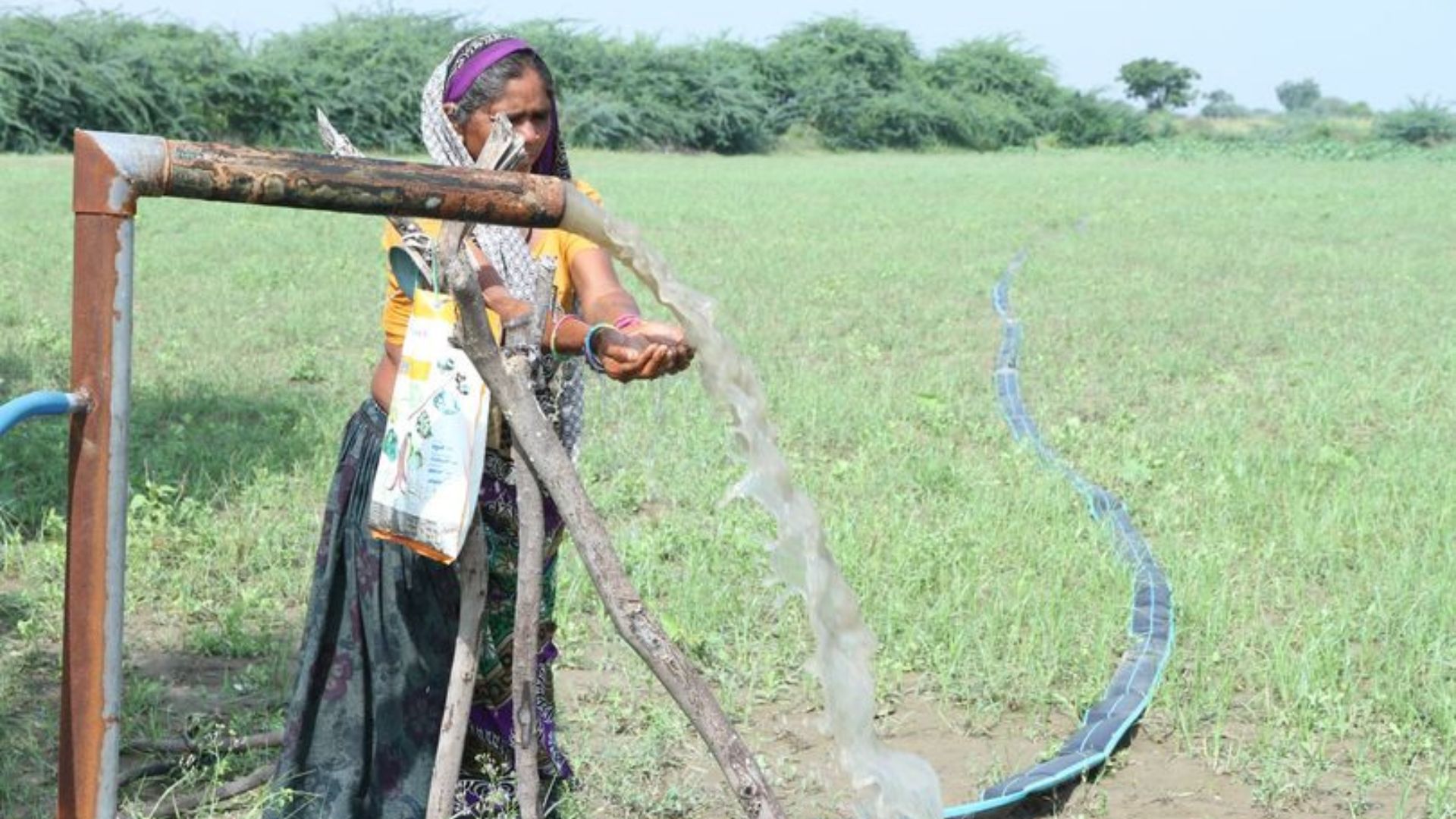The innovative Bhungroo irrigation system, developed by Fulbright Scholar Trupti Jain’s social enterprise, helps farmers prosper in the face of climate change.
May 2020

The Bhungroo system helps farmers access stored water to irrigate their crops. Photograph courtesy Biplab Ketan Paul
Climate change is changing everything, and some of the most drastically affected people are the world’s poorest. Case in point, the millions of farming families in India who must find ways to cope with the increasingly volatile weather patterns, or lose valuable crops and vital income as a result. Around two million of them are affected by water scarcity during lean periods and excess water during the rainy season.
Naireeta Services, a Gujarat-based social enterprise, has developed an innovative irrigation system, named Bhungroo, to help with the problem. “During my childhood in West Bengal, I saw the devastation caused by floods and, in my late 20s, I observed the issues related to paucity of water and severe drought in Gujarat,” says Biplab Ketan Paul, co-founder, innovator and director of the enterprise. “These two diametrically opposite phenomena convinced me of the strength and power of Mother Nature. It was also an eye-opener for me to understand human follies and humanity’s impact on nature.”
Naireeta Services’ invention was developed and refined over nearly two decades. An innovative water management and irrigation system that occupies only a small amount of physical space, Bhungroo drains and filters excess water from farmland during the rainy season, and stores it within natural reservoirs below the soil. Then, during the dry season when rain and water are scarce, farmers access the stored water to irrigate their crops. The effects can be dramatic, minimizing the damage of floods and droughts, and transforming bitter harvests into healthy ones.
Paul says that over 100,000 rural poor have benefited from Bhungroo in India, Bangladesh, Africa and East Asia. Paul and Trupti Jain, co-founder and director of Naireeta Services, have also taken the extraordinary step of making Bhungroo’s technology open-source. In other words, anyone can copy, develop and implement the irrigation system, anywhere in the world, free of charge. The goal? To reach and benefit vulnerable farmers everywhere.
Bhungroo faced many challenges early on, including convincing rural farming communities that they should give the system a try. “It was really difficult for communities to comprehend that, within a space of only one square meter on their farmland, they can have a technology installation that would get rid of all excess water, making their land free from waterlogging,” says Paul. “Their sheer vulnerability and helplessness compelled them not to trust anything new or outside the box, so it was a big challenge to win their confidence.”
How did Naireeta Services address this challenge? “Watching is believing,” says Paul. “We did demonstrations and the results were overwhelming. Nobody looked back after they saw the results.”
Jain brings extensive engineering skills to her work with Naireeta, as well as expertise on issues of gender and climate change. With the help of the knowledge, experience and partnerships she gained as a Fulbright Scholar in environment and governance at Michigan State University in 2012-13, Jain has focused Naireeta Services’ efforts on making Bhungroo available to poor women, empowering them to become self-sufficient and gain agency in their lives. Jain’s Fulbright experience also involved discussions on water issues with students from other countries that face similar climate-based challenges.
Naireeta Services’ efforts to improve lives through Bhungroo’s technology were bolstered by a grant from the Millennium Alliance, a consortium of partners including the Government of India, the U.S. Agency for International Development (USAID) and others. The alliance provides funding, capacity building and business development support to Indian social enterprises. “They unfolded the global opportunities within the farm sector,” says Paul. “From a single district in India, we have now successfully expanded our work across 12 states of India along with Southeast and East Asia and Africa.”
With help from the Securing Water for Food program of USAID, in particular, Naireeta Services was able to further improve its management structure, save time and costs, and access higher-quality technical assistance. “All these were highly useful for quicker and more accurate decisions on all work fronts,” says Paul.
In the wake of the coronavirus pandemic, Naireeta Services launched awareness sessions across India through its state teams and over 31,000 members from eight states received information in local languages on how to stay safe from the virus. Additionally, Bhungroo women members and the organization’s women climate leaders augmented the capacities of over 210 women self-help group members to conduct peer monitoring and support. They helped monitor more than 18,700 rural people in the Patan district of Gujarat and provided training on how to report cases with critical symptoms to appropriate authorities. The social enterprise has also distributed personal protective equipment to about 410 families and facilitated its partners to undertake sourcing and distribution of relief packages in areas with a high rate of migration and with a large number of vulnerable people.
As the Bhungroo technology spreads, Jain and Paul expect to see their efforts touch millions more poor, rural families around the world, guaranteeing food security and safe adaptation to climate change. They also recognize that addressing issues of global warming and poverty requires the participation of all generations. As a jury member and mentor for the Incubation Center of Indian Institute of Technology Kanpur, Paul deals with many young innovators. He describes the successful ones as those who identify the “pain point” of clients and find solutions that fix the most acute problems. “If these criteria are honored, then a social enterprise is guaranteed to succeed,” he says. “Everything else will follow.”
Michael Gallant is the founder and chief executive officer of Gallant Music. He lives in New York City.
COMMENTS